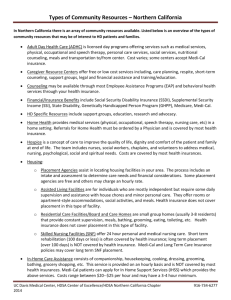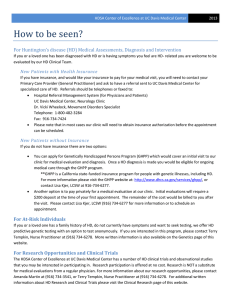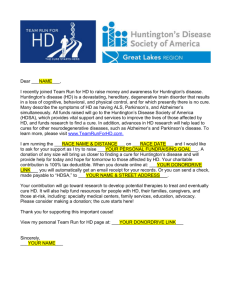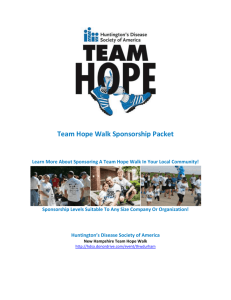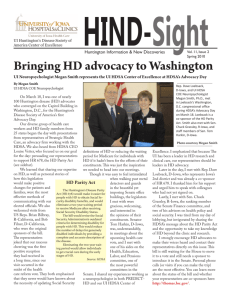Frequently Asked Questions For HD Patients, Families and Community
advertisement
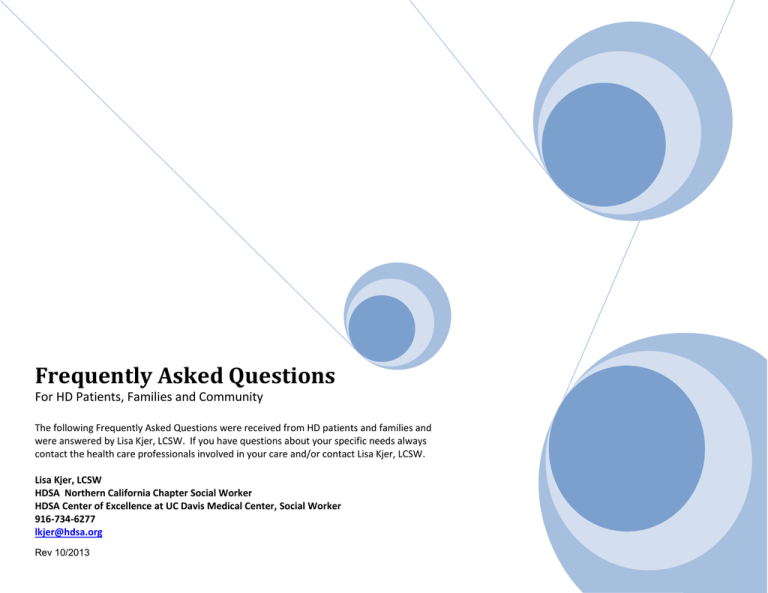
Frequently Asked Questions For HD Patients, Families and Community The following Frequently Asked Questions were received from HD patients and families and were answered by Lisa Kjer, LCSW. If you have questions about your specific needs always contact the health care professionals involved in your care and/or contact Lisa Kjer, LCSW. Lisa Kjer, LCSW HDSA Northern California Chapter Social Worker HDSA Center of Excellence at UC Davis Medical Center, Social Worker 916-734-6277 lkjer@hdsa.org Rev 10/2013 Updated 04/2013 Subject Matter Clinical Trials and Studies Frequently Asked Questions Question Where can I find information regarding HD clinical trials and studies? Education/Training Are there any classes offered by the Events UC Davis Center for Excellence that deal with training and helping caregivers to anticipate and manage changes with the HD individual? Education/Training Can I receive e-mail notifications Events about upcoming educational events and activities? Answer Internet resources: www.hdtrials.org www.hdbuzz.net www.huntington-study-group.org www.clinicaltrials.gov To find out what trials/studies are available locally and to identify if you are eligible please call: UC Davis HDSA Center of Excellence (916) 734-3541 UC San Francisco Memory & Aging Center (415) 476-2909 Stanford University (650) 724-8278 HDSA Northern California Chapter Convention is held annually the first weekend in May. There are speakers and presentations on a variety of topics including: physical therapy, government benefits, managing depression, anxiety, research, genetics, caregiving, etc. Additional training and educational opportunities may be available throughout the year. As educational events are scheduled HDSA Chapter members and HD Support Group facilitators will be notified via e-mail. You may also check the HDSA and HDSA Northern California website as well for upcoming educational events. www.hdsa.org/nocal www.hdsa.org Both the Northern California Chapter and National HDSA have e-mail notification systems to inform you of upcoming activities. HDSA National: www.hdsa.org Click "Sign Up" at the very top of the webpage and enter your contact information. Northern California HDSA Chapter: www.hdsa.org/nocal Scroll near bottom of page to the area in blue titled: “Would you like to be informed of our events, support groups and advocacy information. Subscribe to our mailing list!” Enter your e-mail address and click Subscribe. If you have questions or need assistance please contact Lisa Kjer, LCSW at 916-734-6277. Rev 10/2013 Updated 04/2013 Frequently Asked Questions Subject Matter Exercise – Brain Question What can caregivers do to help HD patients exercise/use their brains effectively? Financial – Hardship Programs Do you know of any outside funding sources if our family is not able to meet our obligations? Financial -Mortgage We are having difficulties paying our mortgage, there are some programs that adjust mortgages due to hardship; are there any negatives in doing this? Answer To my knowledge there is no specific exercise(s) that has been scientifically proven to improve brain function. HD is a neurological disorder that attacks the brain and causes damage in how it functions. The damage to the brain is not a result of not exercising or using your brain effectively, but due to the HD gene attacking the brain. Health care professionals will always recommend a healthy and nutritious diet as well as daily exercise to increase overall health and functioning. In addition to your physical health, your emotional health can have both positive and negative impacts on your overall health; therefore reducing stress may have a positive impact. You can reduce stress by asking others to assist you with responsibilities; relaxation activities such as yoga, deep breathing, meditation, etc; taking time to do something you enjoy, watching movies, connecting with friends/family, or pampering yourself may be beneficial in improving overall health. If you are having difficulties meeting your financial obligations you may consider speaking with your bank or a Financial Planner as they may be able to better assist you in identifying programs or opportunities that may help you meet your specific financial obligations. I cannot offer any advice in regards to mortgages or adjustment loans as that is not my area of expertise. However, I can recommend speaking to a professional in the Mortgage, Real Estate and/or Financial Planning business as they would be able to evaluate your specific situation and provide you with the most recent information/programs available as well as pros/cons. If you have questions or need assistance please contact Lisa Kjer, LCSW at 916-734-6277. Rev 10/2013 Updated 04/2013 Subject Matter Insurance – 2010 Affordable Care Act (“Obama Care”) Insurance – Long Term Care Insurance – Long Term Care Frequently Asked Questions Question How will the 2010 Affordable Care Act help me? Have you researched the new federal program that provides longterm care insurance for selfemployed people and people with pre-existing conditions: the CLASS Act? Can you explain how this works? How does long term care insurance work? Answer The 2010 Affordable Care Act signed by President Obama required each state to set up a system to offer affordable health care to their residents. In California, January 2014 will mark the implementation of the 2010 Affordable Health Care Act signed by President Obama. California has established the California Health Benefit Exchange to implement the online health insurance marketplace which will allow individuals, families and small businesses find affordable health insurance and apply federal tax credits towards the cost. Pre-enrollment starts in October 2013 through March 2013, enrollment after this time can only be done in special circumstances due to change in situation (marriage, loss of previous insurance, birth of child, etc). Please visit www.healthexchange.ca.gov for more information. The CLASS Act was to be part of the Patient Protection and Affordable Care Act, to create a voluntary and public long-term care insurance option for employees, however it was repealed in Jan 2013 as it was determined to be unworkable. Long Term Care Insurance is purchased in addition to medical insurance. Long Term Care Insurance can cover care expenses such as in-home assistance, Adult Day Health Care, and out of home placement. The amount they will pay for this care is dependent on your policy. Many of the above services are NOT covered by medical insurance (i.e. Medicare, private health insurance). To learn more about long term care insurance please visit www.rureadyca.org . If you have questions or need assistance please contact Lisa Kjer, LCSW at 916-734-6277. Rev 10/2013 Updated 04/2013 Subject Matter Medical Equipment Frequently Asked Questions Question Is there any place where caregivers can find tools and ideas for helping one another? For instance, I need to know if anyone has used a suction machine at home…as swallowing becomes more difficult I want to have one available. Is there a specific website that has a section devoted to adaptive tools that work, (i.e. beds, wheelchairs, padding, utensils, cups, shoes, etc.)? Answer First, before purchasing/using any medical equipment I would strongly recommend discussing your needs with your health care team (ie. MD, Physical Therapist, Nurse, Speech Therapist, etc) to ensure that the equipment is appropriate and safe. For information about medical equipment: HD Support Groups are a good resource to speak to others that have/are experiencing similar situations. They may be willing to share techniques, equipment and/or ideas that may assist your specific needs. On-line caregiver support groups may also be a resource to ask questions and get feedback from others. Family Caregiver Alliance Huntington’s Disease & Movements Disorder Discussion Group: www.caregiver.org; to subscribe click on Groups tab and select HDMD group. Family Caregiver Alliance Caregivers On line Group: www.caregiver.org; to subscribe click on the Groups tab and select the Caregiver Online group. HD Soul (Significant Others United in Love): http://health.groups.yahoo.com/group/hdsoul/ HDSA Online Equipment Exchange Board: www.hdsa.org; is designed to facilitate the sharing of durable medical equipment such as Broda chairs and beds, wheelchairs, walkers, hospital bed accessories, and assistive mobility devices. The Equipment Board offers a forum for families to support one another by posting information about durable medical equipment they no longer need. To post your used equipment, or to see what is available, just go to the Living with HD section of the HDSA website. HDSA does not participate in any equipment transaction, nor can it take possession of posted equipment or offer advice about the suitability of equipment for your loved one. Broda Seating: www.brodaseating.com In Step Mobility: www.ustep.com If you have questions or need assistance please contact Lisa Kjer, LCSW at 916-734-6277. Rev 10/2013 Updated 04/2013 Subject Matter Placement – Long Term Care Frequently Asked Questions Question Is there any list of facilities that will accept HD individuals? I’m concerned for the time that may come when my loved one outlives his/her money and he/she ends up on Medi-Cal? Answer In Northern California we do not currently have any long term care facilities that specialize in HD. However, there are three different levels of out of home placement that is available throughout Northern California. The type of placement needed will be dependent on the patient’s care needs. All of these facilities are able to accept persons with a variety of illnesses, including HD; however each facility has the discretion to accept or deny admission. Keep in mind that the long term placement process can take many months and will take a great deal of persistence and patience. Assisted Living Facilities are for individuals who are mostly independent but require some daily supervision and assistance with house chores and minor personal care. They offer rooms or apartment-style accommodations, social activities, and meals. Health insurance does not cover placement in this type of facility. Long Term Care Insurance may cover placement in this type of facility. Residential Care Facilities/Board and Care Homes are small group homes (usually 3-8 residents) that provide constant supervision, meals, bathing, grooming, eating, toileting, etc. Health insurance does not cover placement in this type of facility. Long Term Care Insurance may cover placement in this type of facility. Skilled Nursing Facilities (SNF) offer 24 hour personal and medical nursing care. Long term placement (over 100 days) is NOT covered by health insurance, however is covered by most Long Term Care Insurance policies and is covered by Medi-Cal. If you do not have the above insurance, placement will need to be paid privately. SNF placement costs vary by the patient care needs and by where you live, however at minimum the cost would be about $5,000 per month. To identify placement facilities in your area and for a listing of SNFs that has or has had experience with HD please refer to the Northern California Resources guide. To receive a copy of the guide contact Lisa Kjer, LCSW via e-mail lkjer@hdsa.org or phone 916-734-6277. If you have questions or need assistance please contact Lisa Kjer, LCSW at 916-734-6277. Rev 10/2013 Updated 04/2013 Frequently Asked Questions Subject Matter Placement— Veterans Question If I am a veteran with HD who served in a war, am I eligible to reside in a VA Nursing Home? Resources – Respite, Home Health, In-Home Assistance Do you have any information about Respite or Home Health Services? Answer My understanding is VA Nursing Home placement is restricted to veterans that have a service connection of 70% or higher. You will likely have a service connection if you experienced an illness or injury as a direct result of your military service. The VA determines service connection. For specific information on the VA Benefits you may be eligible for please contact the VA nearest you or visit www.va.gov. There are also Veteran Homes in California. These homes usually have multiple levels of care: independent living, assisted living and nursing home. In general the homes are designed for people to enter when they are relatively healthy and can live independently. Then as the resident’s age and need additional care it can be offered at the same location. There is a cost associated with Veteran Homes. For more information visit the www.cdva.ca.gov. For specifics regarding eligibility requirements contact http://www.cdva.ca.gov/Homes/Admissions.aspx RESPITE: Some of the Family Caregiver Resource Centers had/have respite programs. However, some of these respite programs have been suspended due to lack of funding. There are some Assisted Living Facilities or Alzheimer's Living Facilities that have respite services at a cost. They usually will have an apartment like setting where a family can bring a loved one for short term (usually up to 2 weeks) for respite. This respite care is for if family is going out of town and the patient cannot travel with them, etc. The patient in this case would stay overnight at their facility and cared for by their staff. Adult Day Health Care is a good resource to give caregivers a break during the day. Long Term Care Insurance may cover this care. The patient can often get picked up at home and will be taken to the facility for socialization, physical therapy and meals during the program. Usually is about a 6 hour program to give caregivers a break and provide services to the patient. In-Home Support Services (IHSS) is a program for Medi-Cal If you have questions or need assistance please contact Lisa Kjer, LCSW at 916-734-6277. Rev 10/2013 Updated 04/2013 Subject Matter Resources – Socialization Frequently Asked Questions Question Answer recipients. If patients are granted IHSS hours, they may hire family members or outside caregivers to care for their needs and in doing so may offer respite to the primary caregivers. HOME HEALTH: Home Health has to be ordered by a Physician and is short term, specifically if patient just got out of hospital, rehabilitation center, etc. This is available for patients that have a skilled need where a nurse is required to follow patient during recovery at home. In Home Assistance is available for a cost (may be covered by Long Term Care Insurance). It is usually around $15--$25 per hour depending on where a person lives and their care needs. Services provided are companionship and custodial care needs (eating, dressing, cooking, cleaning, bathing, etc). Medi-Cal recipients may be eligible to get this benefit through IHSS (see above). To identify resources in your area please refer to the Northern California Resources guide. To receive a copy of the guide contact Lisa Kjer, LCSW via e-mail lkjer@hdsa.org or phone 916-734-6277. I am retiring from work and will miss To increase and/or maintain social interaction you may want to consider: the social interaction, what resources Volunteering for a cause that is of interest to you. can you recommend? Participating in an HD Support Group. Plan and schedule frequent gatherings with friends/family/neighbors/co-workers. Local Senior Centers offer a variety of activities, gatherings for persons 65 years or older. Join a local church group. Many local coffee shops, libraries, community centers will have postings of the social activities/events happening in the community. If you have questions or need assistance please contact Lisa Kjer, LCSW at 916-734-6277. Rev 10/2013 Updated 04/2013 Frequently Asked Questions Subject Matter Resources— Completing Forms Question Is there a resource for hands-on, free help in completing important forms like Power of Attorney, social security, bank, health care, etc? Social Security I heard social security added HD as a disability, what does that mean? Answer Unfortunately I am not aware of any community agency or program that offers assistance in completing forms. That said, there are resources that may provide more information that will aid someone in completing specific forms or agencies that will assist in completing a form specific to their work. Examples: Social Security Disability Forms: There are local Social Security offices throughout the state. You are able to make an appointment with a Social Security employee to get forms, ask questions and complete your Disability forms. Please call 1-800-772-1213 to find the nearest Social Security office near you. A listing of Social Security Offices is also available by visiting www.ssa.gov. Financial Power of Attorney: Banks and other financial institutions may assist you in completing the Power of Attorney for Finances as needed by their institution. Health Care Power of Attorney: information regarding Advance Health Care Directives and how to complete can be found via the internet at: www.finalchoices.org; www.sacdecisions.org; www.caregiver.org. If you need assistance with completing forms or you have questions about any forms, I am available to assist with answering questions and problem solving. Please contact me directly at 916-734-6277 to discuss your specific needs. Adult on-set Huntington’s Disease (HD) and Juvenile Huntington’s Disease (JHD) were both added to the Social Security Administration’s Compassionate Allowance List (CAL). This means applications under the Social Security Disability Income (SSDI) or Supplemental Security Income (SSI) programs will be expedited for people with a Huntington’s Disease diagnosis. Have a gene positive blood test does NOT automatically qualify you for Social Security Disability, you must be diagnosed by a MD and have symptoms that prevent you from employment. There is no change to the application process. For more information about applying for Social Security please visit www.ssa.gov or visit HDSA webpage http://www.hdsa.org/living-with- If you have questions or need assistance please contact Lisa Kjer, LCSW at 916-734-6277. Rev 10/2013 Updated 04/2013 Subject Matter Social Worker Role Social Worker Role Volunteer Opportunities— Community Frequently Asked Questions Question Answer huntingtons/family-care/disability/index.html What are the types of outside Majority of the information and recommendations I provide are for Adult referrals that you (HDSA Social Day Health Care, Placement Agencies, Skilled Nursing Facilities, Social Worker) typically make? Security Disability, Counseling, In-Home Assistance, Support Groups, etc. To identify resources in your area please refer to the Northern California Resources guide. To receive a copy of the guide contact Lisa Kjer, LCSW via e-mail lkjer@hdsa.org or phone 916-734-6277. What services is a social worker As the HDSA Chapter Social Worker, I can provide a variety of services good for? including: Supportive Counseling for HD patients, families and caregivers: family care meetings, grief support, presentations/trainings about HD, problem solving, emotional support. Linkage to Community Resources and Benefits: Medi-Cal, Disability, in home assistance, Out of Home placement, Adult Day Health Care, HD support groups, etc. Information and Education: managing HD, advance care planning, what to expect, how to talk to your children about HD, etc. Community Advocacy and Education: trainings and presentations to Board and Care homes, nursing facilities or other community caregivers about HD, how to care for persons with HD, etc. Are there any volunteer opportunities Every community will have a variety of volunteer opportunities. My in the community? recommendation is to find a cause you are passionate about or interested in and contact any agencies, non-profits or groups that address this cause. Northern California HDSA Chapter may need volunteers for specific events, please contact Madalyn Guevara @ mguevara@hdsa.org or (916) 927-4400 to see what opportunities are available. Salvation Army, Red Cross, Volunteers of America, and most other non-profit organizations welcome and need volunteers. You may also look in the local newspaper(s), magazines or Craigslist for ads seeking volunteers. If you have questions or need assistance please contact Lisa Kjer, LCSW at 916-734-6277. Rev 10/2013 Updated 04/2013 Subject Matter Volunteer Opportunities-HDSA Frequently Asked Questions Question Are there volunteer opportunities with HDSA? Answer If you would like to volunteer with HDSA please contact Madalyn Guevara at (916) 927-4400 or mguevara@hdsa.org for the upcoming events in which volunteers may be needed. If you have questions or need assistance please contact Lisa Kjer, LCSW at 916-734-6277. Rev 10/2013
